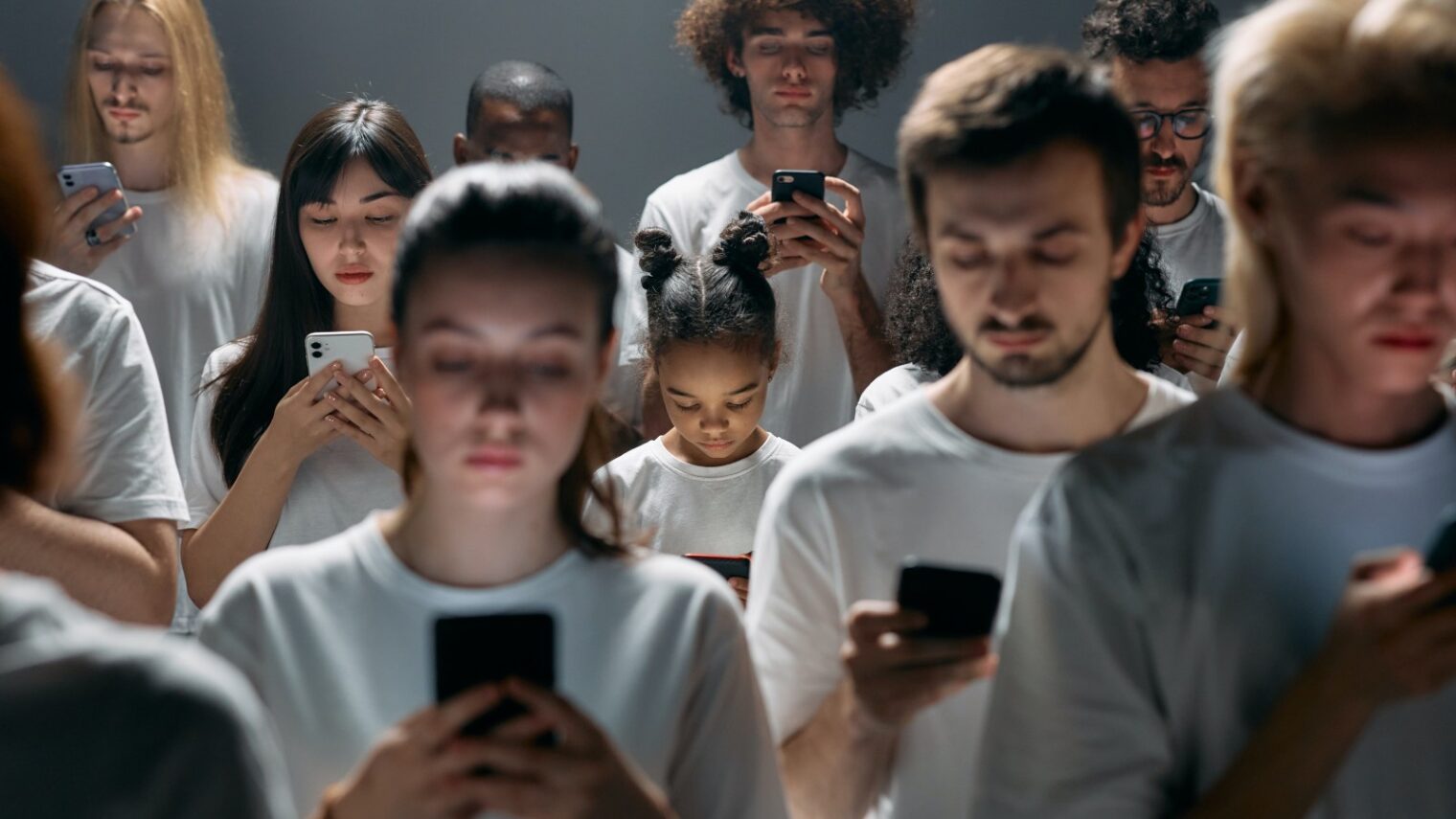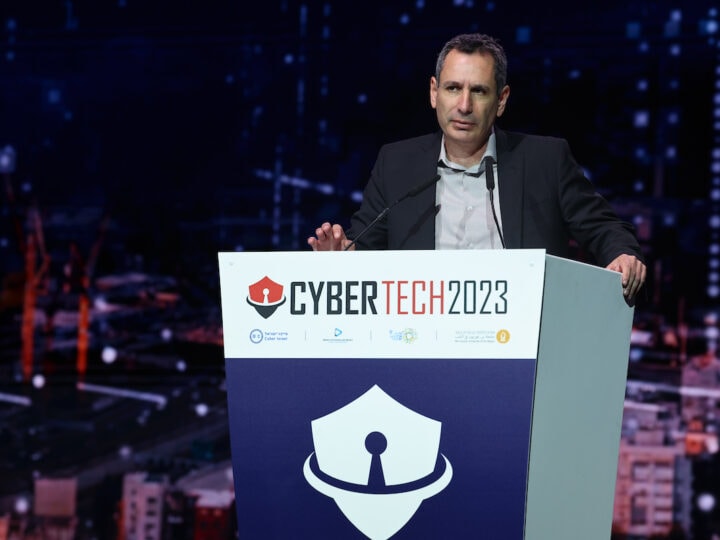Over a billion people reach their destinations using crowdsourced data apps such as Waze and Moovit – both, by the way, Israeli inventions.
If input from a critical mass of people can help travelers navigate by car or public transportation, it can also help patients and medical professionals navigate health journeys.
“It’s not that the wisdom of the crowd can replace expert advice, but it empowers patients to become an integral part of their own health team — asking the right questions and gaining better care,” says Mor Levy Gaier, head of marketing for Alike Health.
“In a year, the average American visits the doctor three times, but spends more than 52 hours on the Internet looking for health information. Studies show that patients trust online reviews as much as doctor recommendations — so they should be getting adequate, personalized sources of healthcare data,” she says.
In these times, when nobody goes to a new restaurant without checking the crowd’s reviews on Yelp, Levy Gaier adds, “when it comes to our health, we should be able to tap into this wisdom as well.”
Here we look at Israeli companies harnessing the wisdom of the crowd to improve research, diagnosis, treatment and maintenance for physical and emotional issues.
Alike Health
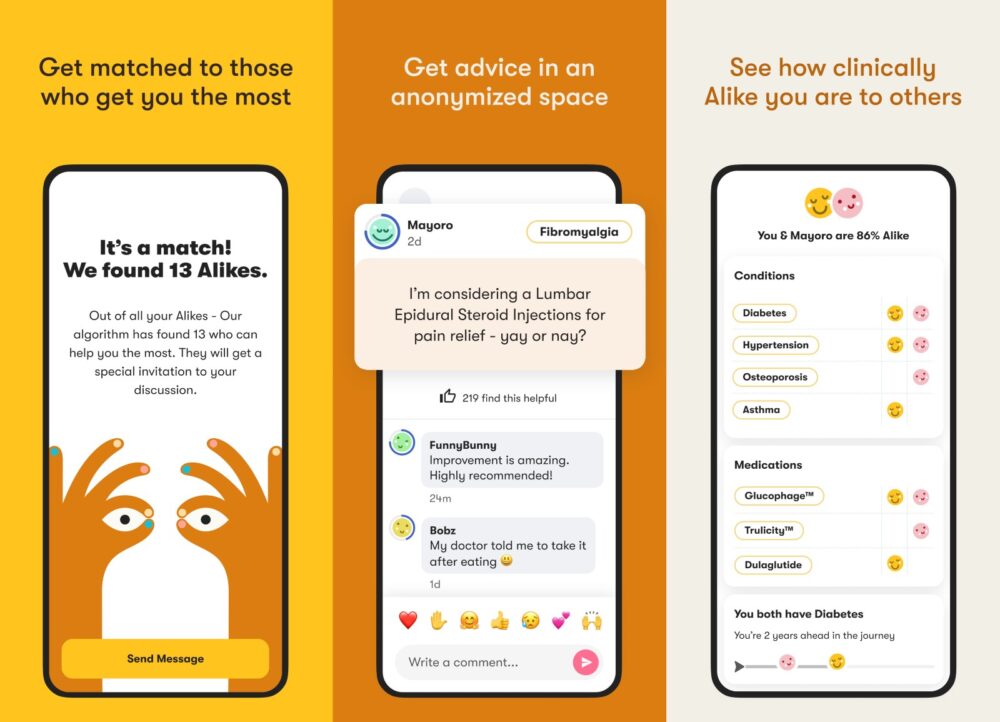
Two people with the same condition may be able to offer each other valuable insights. But unless they have additional commonalities — severity of disease, age, lifestyle and general health profile — these insights could be irrelevant.
Alike Health uses machine learning to create anonymized “patient similarity networks” based on shared diagnoses as well as other health and socio-demographic parameters.
After a year and a half in stealth mode, Tel Aviv-based Alike Health launched its free app in the United States last May and already has tens of thousands of active users. In the past year, Americans have gotten full access to their electronic health records, which helps “Alikers” create more detailed user profiles.
“We are the big bang of what happens when you put clinical data and patient testimonies in the same place. This is an unusual mix in the world of digital health apps,” says Gaier.
Patients can share information and experiences in their Alike community to better manage their condition and receive mutual emotional and social support. They can access large American, British and Israeli databases to gauge the prevalence of their condition and see how others are treating it.
Alike was founded by cybersecurity pioneer Amnon Bar-Lev, physician Varda Shalev and data scientist Ohad Zadok.
“We are a mix of Tinder and Waze for health,” says Bar-Lev. “Tinder because we match people to those who are most medically ‘Alike’ them, and Waze because you can learn from someone who shares your journey, in real time.”
Cofounded by Yael Elish, a core member of the Waze founding team, StuffThatWorks helps people learn which treatments work best for their condition using AI-based crowdsourcing.
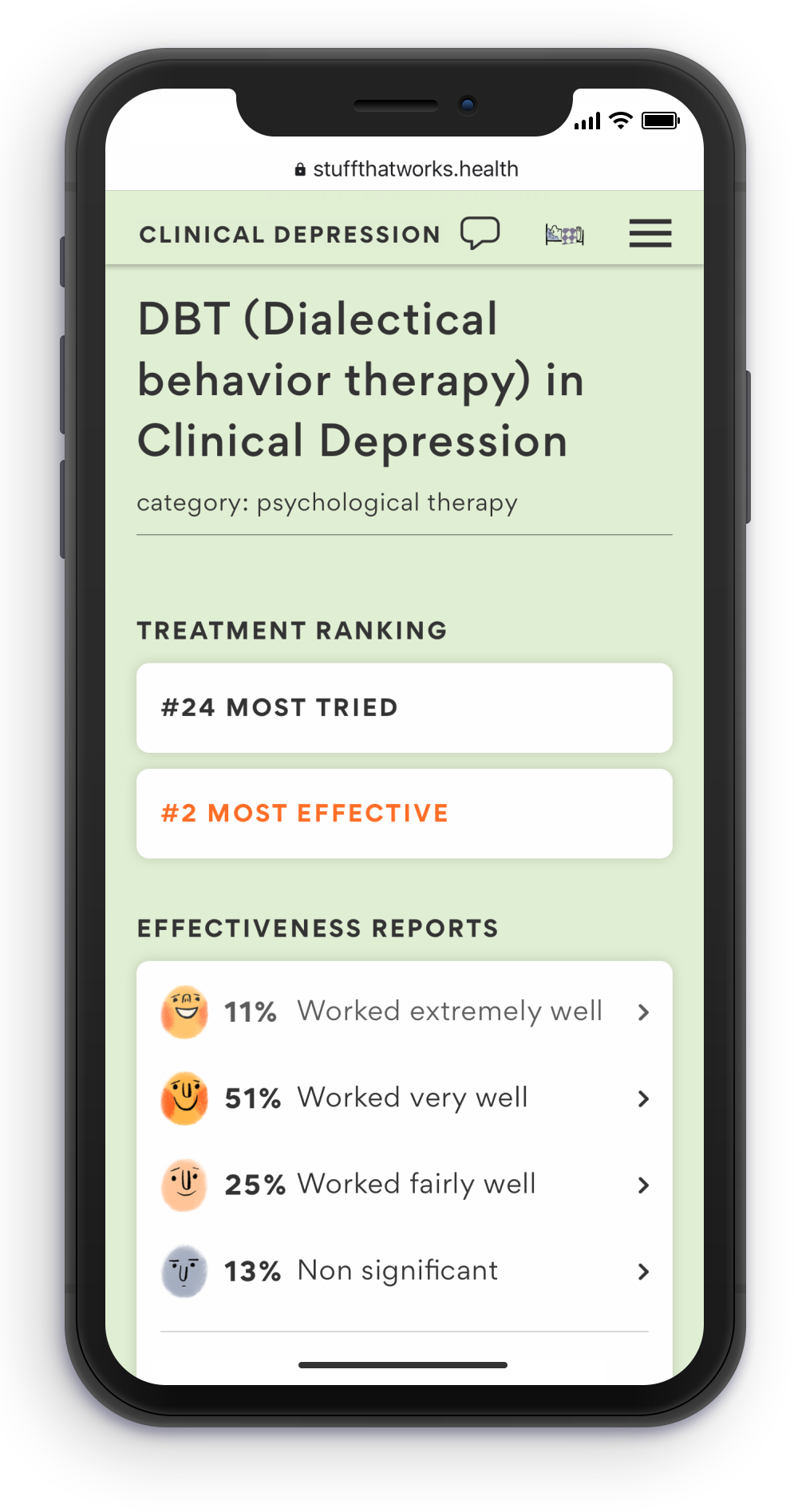
People with chronic conditions answer a survey about treatments tried, their effectiveness, side effects and more.
This data is then normalized, anonymized and analyzed using advanced machine learning algorithms programmed to find and map insights to share with the entire condition community, subgroups and individuals.
The StuffThatWorks “similarity map” currently has input from about a million contributors representing more than 580 medical conditions. Overall, the site counts 2.6 million members and 70.9 million data points.
Members can comment, discuss and pose new research questions. The more people join and contribute their information, the smarter and more personalized the insights become.
“The answers are out there. The individuals who have tried various treatments know best what has worked. All that’s missing is a way to empower them to share this data in an organized fashion that’s optimized for analysis,” said Elish.
Elish adds that because clinical trials are performed on small groups of people in a highly controlled environment, they do not represent the complexities and diversity of people in the real world. And it doesn’t allow for comparing effectiveness among many different treatment options.
“When there’s so little data, the reality is that we’re treated on a trial-and-error basis, and are usually not getting the treatment that’s optimal for us. … This is where crowdsourcing revolutionizes: Big numbers. Big numbers are what’s been missing,” she says.
Belong.Life
Belong.Life launched its first app, “Beating Cancer Together,” in 2015 and is now the world’s largest social network for cancer patients. Belong then developed apps for patients with chronic conditions, including BelongMS and BelongIBD.
Today, more than a million patients, family members and caregivers worldwide use Belong.Life’s free apps for guidance, support and education. The anonymous platform enables discussions of topics including many that Belong.Life members don’t feel comfortable mentioning to their doctor.
Using some 1,500 AI and machine learning algorithms, Belong.Life can extract novel insights from this unusually large cohort to share with researchers across the world.
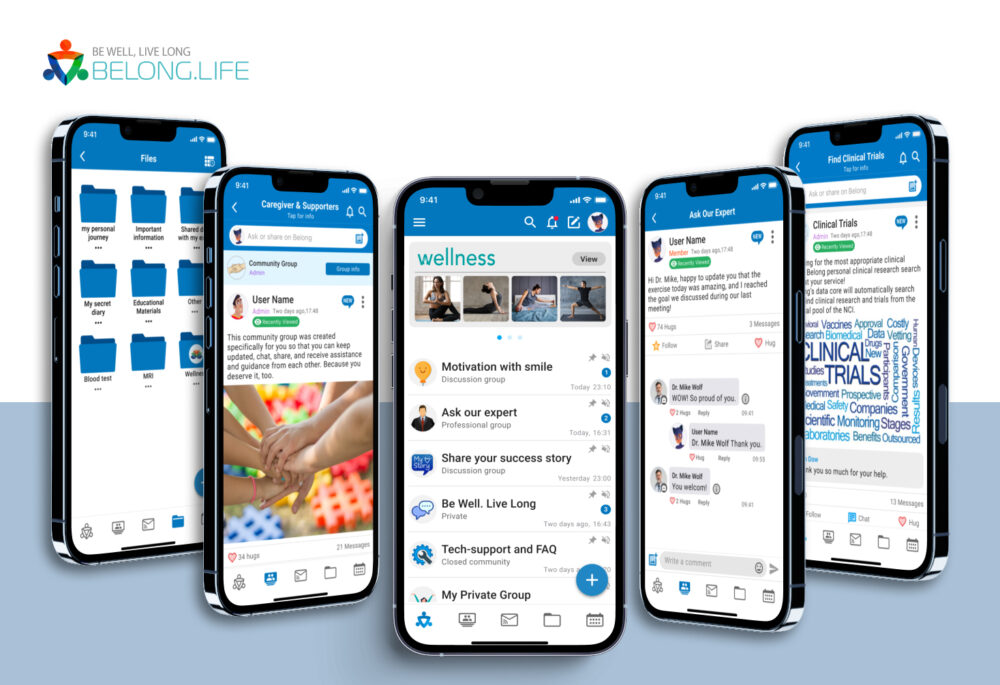
Belong.Life Medical Director Dr. Daniel Vorobiof, an oncologist, says cancer research and clinical trials are limited to small cohorts and are of limited value. The abundant information mined and analyzed from the apps “help us discover new connections and patterns to gain deeper insights into many neglected aspects of cancer care.”
One study grew out of young breast cancer patients’ discussions regarding sexuality and body image. Another picked up on chats about “financial toxicity” affecting cancer patients and their families.
Yet another study revealed that unvaccinated cancer patients are 21.5 times more at risk of contracting Covid-19 than are vaccinated cancer patients.
Vorobiof says an Israeli cardiologist approached Belong.Life to verify an observation she had made regarding heart arrhythmia in cancer patients using cannabis. “We found a certain percentage, not high, do seek cardiological care because of arrhythmia. The cardiologist presented a paper that was the first study of this specific side effect.”
Although the main objective of Belong.Life hasn’t changed, using its crowd wisdom for research has become a significant outgrowth.
“We can analyze subjective feelings and sentiments of a very large number of patients and caregivers that you could not get easily any other way,” says Vorobiof.
Wisdo
Wisdo is described as “a company and movement helping people take on life’s most meaningful experiences by relying on the wisdom of people who’ve been there.”
The app offers virtual communities for people seeking peer support for emotional issues including loneliness, anxiety and heartbreak; and encouragement toward meeting specific goals such as making new friends or finding purpose.
An AI engine continuously introduces users who share similar life experiences and goals. They may choose to connect through a mentor-facilitated group or one-on-one sessions.
With more than a million users of the subscription-based app since 2018, Wisdo claims it can “reduce social isolation rates by 23%, increase the number of mentally and physically healthy days experienced by its members by 39%, and reduce overall medical costs.”
Highly rated on both App Store and Google Play, Wisdo was named one of the world’s most innovative companies in 2019 by Fast Company.
Founder and CEO Boaz Gaon, a journalist, started the social wellness community after dealing with his father’s terminal illness. “In writing about his death, I found comfort and community with readers who understood and empathized because they, too, had lost loved ones.”
Anonymized data extracted from the app is being used for research. One recent study compares baseline data collected from 40,000 Wisdo users aged 17-80 (59% female) who joined Wisdo during two peaks of the Covid-19 pandemic (June to October 2020 and June to October 2021).
“The data shows staggering changes in adult mental health, sleep, medication intake, and motivation to help others as effects of the Covid-19 pandemic drag on,” the report summarized.
Specific data points: 60% developed sleep problems from June to October 2021 (a 46% increase over the same period in 2020), 34% took medication to address mental health (an 89% increase); 32% experienced weight changes (a 45% increase); and 30% reported that depression impacted their career (a 7% increase).
Medivizor
Launched 10 years ago, Medivizor is a free web-based subscription service that curates medical studies, guidelines, warnings, clinical trial enrollment and other information tailored to each user, delivering interpreted summaries in lay language.
A Medivizor spokesman explains that the English-language platform – used by “a couple hundred thousand patients in 129 countries, 80 percent of them from the US” – mines information using both explicit and implicit personalization.
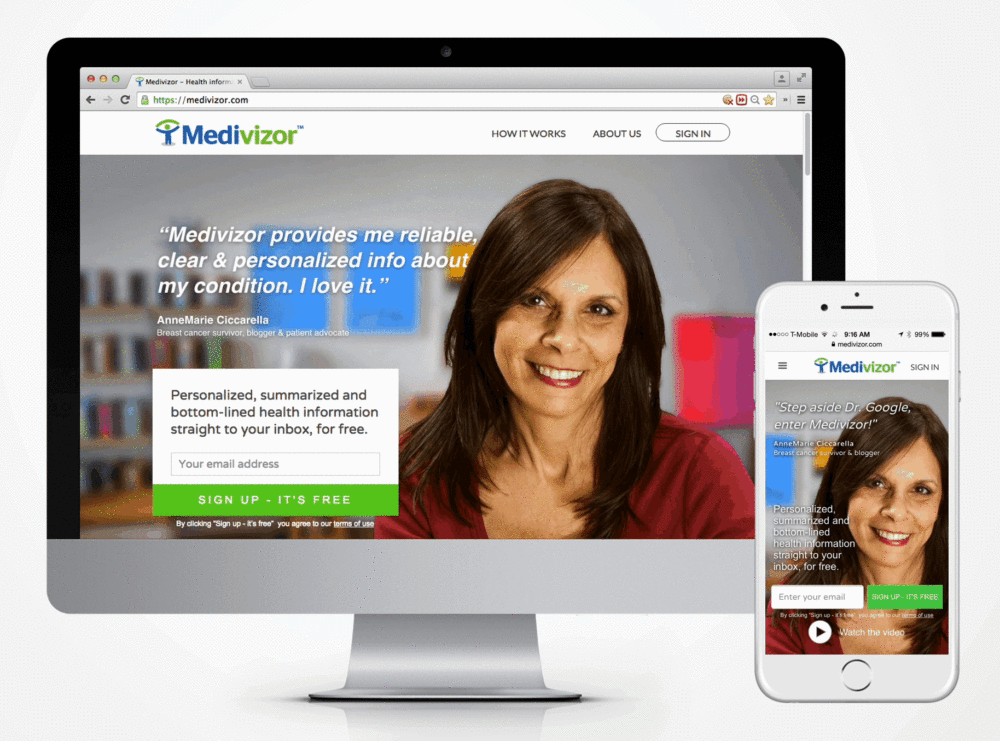
Explicit personalization is based on the user’s medical profile. For instance, every year there are some 20,000 research papers on breast cancer and 1,700 clinical trials for breast cancer patients. Details such as specific type of breast cancer, genetic markers, treatment history, age, weight and comorbidities help filter out reams of irrelevant content.
Implicit personalization incorporates crowd wisdom: All the actions of Medivizor subscribers passively work together to curate the data further.
When someone opens an item, comments on it, applies to a clinical trial through the platform, or takes any other action (or inaction), this helps the algorithm prioritize information for that user based on the similarity of his or her situation and reactions to those of other users.
“If there are 50 clinical trials and one gets more traction from people most like you, we know that trial is more likely to be useful for you and the algorithm prioritizes it for you,” says the spokesman.
In addition, crowd wisdom enables Medivizor to group subscribers into thousands of “micro communities” for anonymous conversations, centered around the content in which they share the most interest.
Genoox
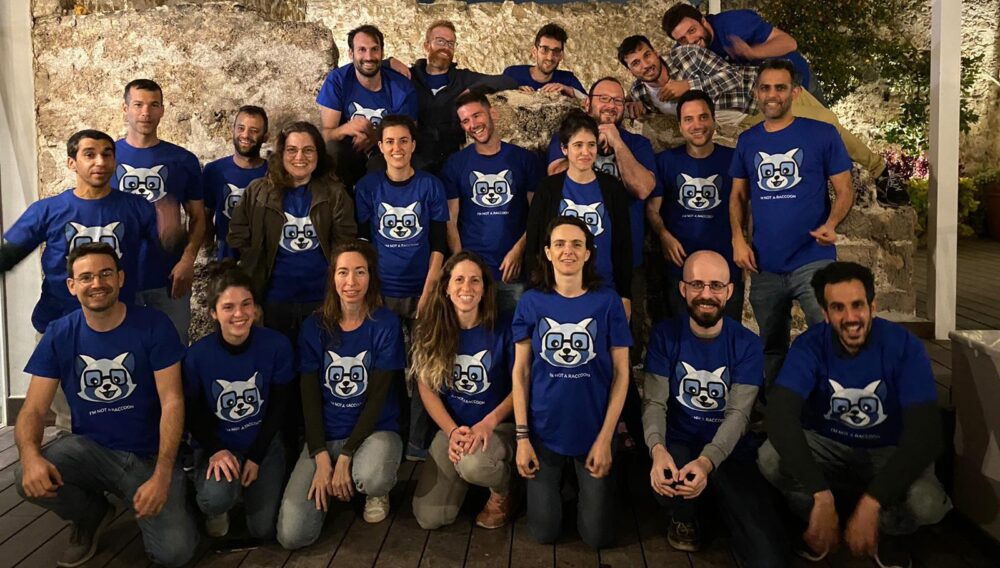
Genoox (pronounced “gee-nox”) provides a platform called Franklin on which genetics professionals can find actionable insights from the largest real-time genomic database and share their insights with colleagues.
This crowdsourcing helps professionals individualize patient care using the most up-to-date information available.
“Clinicians are using our platform daily around the world in the diagnosis and treatment of genetic disorders and cancer, as well as new drug discovery and family planning,” says Assaf Sahar, business development lead for Genoox.
“We work with more than 1,700 institutions in 44 countries, including the biggest and most advanced hospitals. Every month, our community generates close to 6,000 patient cases.”
The company was founded by a team of geneticists, bioinformaticians, engineers and technologists. Genoox is based in Tel Aviv with an office in the United States, its largest market.
Sahar gave a concrete example of how Genoox helps clinicians help their patients.
Recently, a “variant of uncertain significance” was discovered in a pregnant woman’s genetic panel. A genetic scientist at the Maccabi HMO – a Genoox client — found nothing in the literature about this variant.
Then he checked on Franklin and saw that a team at an Israeli children’s hospital reported this variant causes severe heart issues. Once confirmed, this information was vital in helping the woman and her partner decide whether to terminate the pregnancy.
“We try to reduce the uncertainty in genetics,” says Sahar.




